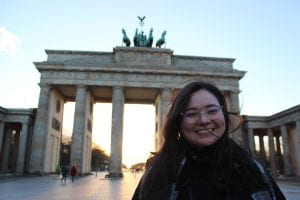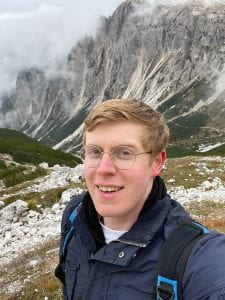

NAME: Diana Vazquez
MAJOR: Anthropology
PROGRAM: Germany CSU IP – University of Tubingen 2019-2020, FLP (Summer 2024): Nevis (ANTH)
EMAIL: diana.vazquez@sjsu.edu
BIO:
Prior to attending SJSU, I was a student at Sonoma State University where I studied Computer Science. During my time there I had the opportunity to study abroad in Germany with CSU IP. However, due to the Pandemic my program was cut short to only one semester instead of the intended year. Despite the brevity of my time abroad, all of my experiences and growth gave me the push I needed to switch majors to something I actually loved doing. When I returned home I transferred to SJSU, and switched my major to Anthropology in order to study Archaeology and get the opportunity to continue exploring and learning about the world. Once here at SJSU I also had the amazing opportunity to study abroad again with the FLP to Nevis for an archaeological field school where I was able to finally dig into the world of archaeology, but also experience new parts of the world I had never seen before. Studying Abroad showed me that I want a career where I can be out in the world exploring and learning about different cultures. It also gave me the courage to dream about relocating abroad, where I hope to get into a Master’s and PhD program. My time studying abroad most definitely gave me a new perspective for the world, and a desire to explore every inch of our planet.
GOALS: What were your goals for studying abroad?
When I left for my study abroad program, I had a long list of goals I wanted to achieve along with a broader rule of “exploring and trying new things.” My largest goal was of course to learn German and feel comfortable speaking the language to locals. Most of my goals centered around experiences and locations that I had been looking forward to for years. Such as going to see as many museums and historical sites as possible or finding a TARDIS in London. On my second program to Nevis in the Caribbean, my main goal was to learn the fundamental skills and techniques needed for an archaeological field project.
PERSONAL GROWTH: What was the biggest impact that your study abroad experience had on you?
Despite having already lived independently the three years prior to going abroad, the experience of being in a whole new country and environment pushed me even further to achieving my goals for my own happiness. At the time of my program, I was a Computer Science major, but I was unhappy being so. I remained in that major because so much of my family supported me doing so, but my time abroad gave me the proper push I needed. I realized that despite nearly completing my major, I wouldn’t live a fulfilling life if I didn’t pursue my true passions. Traveling to new countries and visiting so many world-renowned museums reawakened my love of archaeology, so when I came home I decided to aim for a career I would actually love and switch majors to Anthropology.
Not only did that change bring me immense happiness with my career goals, but it also allowed me to study abroad again and this time with an archaeology centered program. My time in the field school on Nevis cemented how passionate I was about archaeology.
ACADEMICS: How would you describe your academic experience abroad?
The first half of my program was centered completely around learning German, whereas the second half would have been when I could freely choose classes of any discipline. While I didn’t leave Germany fluent in the language, I definitely was comfortable enough speaking it that I could hold a conversation with a local. By the time I left the country, I had a tighter grasp on the more difficult grammar rules and could remember more of the vocabulary. Had my program not been canceled early because of the Pandemic, I would have taken GE classes at the Uni my second semester there. A typical German class does not assign homework, and is instead based completely on lectures, personal studying, and either a final exam or paper.
On the other hand, my time in Nevis with the summer FLP was a much more expedited learning experience. In the short few weeks in the Caribbean I was taught on the field how to work in an archaeological dig by the leading professor and dig crew.
CAREER: What skills did you learn / sharpen during your study abroad experience?
Prior to going abroad, I had been learning German for about two years, so my main goal when studying abroad was to increase my language proficiency. Being immersed in the language so completely definitely helped me nearly complete that goal. In about three months my language level increased so much! During my second program I learned and gained the skills needed to work on an archaeological field project.
COMMUNITY ENGAGEMENT: How has your immersion impacted your perspectives on the world?
There are so many stereotypes of Germans that tend to lean towards them being rude and strong tempered. However, my time in Germany showed me that is not the case. Every German I interacted with was very welcoming and considerate. I went into my program with no expectations for Germany other than a beautiful landscape and cold weather. But I left the program realizing that no matter how much I research a country, I can’t truly know a culture and its people until I actually experience it and immerse myself in said culture.
FUTURE: How has study abroad prepared you for your future?
When I initially began learning German, it was to be able to feel comfortable speaking the language when I studied abroad. I began university with the goal to study abroad, but not necessarily to learn a new language. However, since learning it I have now found out it will actually be very helpful in the field of archaeology. I unintentionally gave myself a very handy skill by studying abroad! Along the same lines, my time traveling to new cultural landscapes and interacting with people from different countries has also prepared me for my future career in archaeology. The skills and experiences I gained while on my FLP will be a crucial cornerstone in my archaeology foundation going forward with my degree and career.
TIPS: What advice would you give to future Global Spartans?
Research! Any possible little question you could have about the location you will be going to, research it. Whether you are going to a whole new country or simply another state, having some knowledge of the location you will be going to will aid you so much. You could assume that your cultures and customs will be similar, but the truth is you won’t really know until you’re there. Research will be your best friend, both before you leave and when there. Another tip I can give is to make the most of your time abroad. Take advantage of every opportunity that presents itself and allow yourself to grow. Lastly, know your limits, don’t feel pressured to take part in experiences you won’t feel comfortable in. This time is for you to explore the world, do so at your own pace. Agreeing to plans you dislike and subsequently missing out on experiences you were looking forward to can end up being stains on an otherwise happy time. Have fun, Spartans!

 NAME: Matthew Heitmann
NAME: Matthew Heitmann